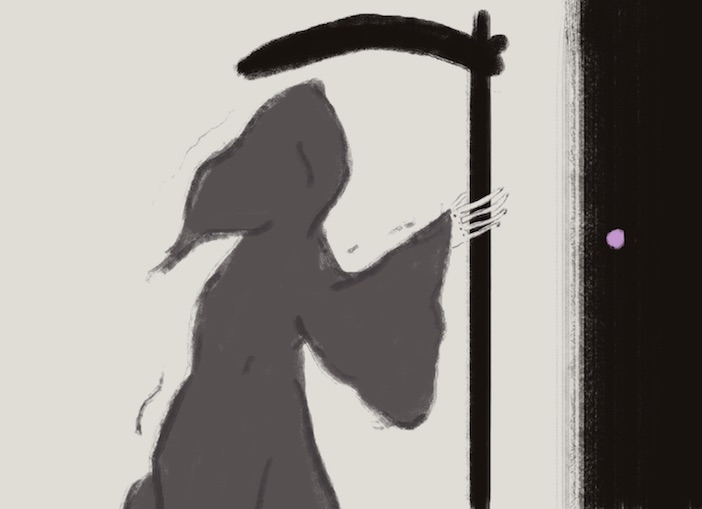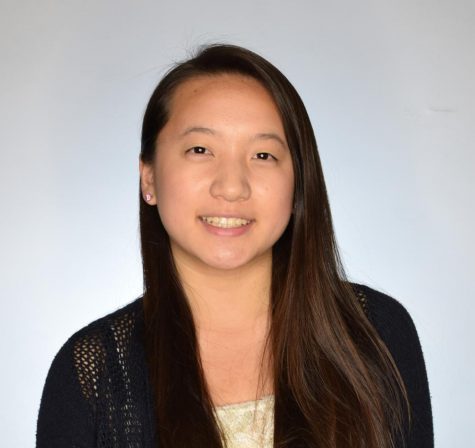Sophomore Yoanna Lee stood in front of her father’s grave in the cemetery, clutching a red rose. She looked around curiously at all her sobbing relatives and family friends, her four-year-old brain unable to comprehend why they were overcome with grief. People knelt over the grave and placed bright flowers around it, adding color to the muted cemetery.
Lee’s mother gestured her forward, her own face streaked with tears. Lee approached her father’s grave and carefully placed a red rose on top of the grave. She remembered how much her father loved red roses and she studied the grave with her father’s name carved into it.
“Daddy, when are you going to come back?”
Although Lee didn’t understand it as a child, her father had passed away after developing skin cancer. Despite the doctors’ best efforts, they were unable to prevent the tumor in his lungs from spreading. They couldn’t risk attempting to surgically remove it. They could only attempt to prolong his life for as long as possible.
“When I was four, I didn’t understand the concept of death,” Lee said. “I knew that things [went] away but I didn’t really understand what that meant. I thought that it was just a long sleep; that was my understanding of death for the longest time.”
Her father’s passing nearly destroyed Lee’s family, making their lives seem hopeless. It took years for Lee’s family to pick up the pieces and continue on. The experience taught her a crucial lesson: death is inevitable and moving past death and continuing on with life is essential. Moving on from death is a heart-wrenching process. Over the centuries, death has become shrouded in myths, superstitions and cryptic beliefs — all created to help people cope with a loved one’s passing.
John Lampe does exactly this everyday — help people cope with death. As an embalmer at Alameda Family Funeral and Cremation, a mortuary in Saratoga, Lampe has been dealing with grieving families on a daily basis since he started working there after high school. An embalmer is the employee who prepares bodies for the funeral service. Lampe’s work has exposed him to countless religious and cultural rituals and beliefs around death.
“We get people of every culture,” Lampe said. “I’ve been doing this for so long, we see everything. That’s one of the things I like about this business, [that] you’re dealing with different kinds of people of different religions. I’ve always been interested in different religions and how they handle death. So to get into the helping them out, it really is interesting.”
Being Christian, Lee explains that her religion served as an outlet for her anger surrounding her father’s death, as it gave her something to blame for his passing. Eventually, Lee’s religion helped her make peace with her father’s death.
“I was very angry with God for a very long time,” Lee said. “My dad was a pastor, so I thought, ‘He was a pastor, he was working so hard for you, how could you take him away?’ I was really angry. I didn’t really know how to cope. But, when I got older, I decided that it was because my dad’s work was done and that he’s in a better place so it doesn’t matter. There was a peace that came with that. It resolved some of the tension in my family.”
Michael Rubino is a funeral counselor at Alameda Family Funeral and Cremation. His job consists of helping grieving families cope with death and arrange funerals. He explains that every culture has a unique approach to death, from the arrangement of tables at the funeral ceremony to the praying rituals performed prior to a loved one’s cremation.
“Every religion, every culture, every nationality has different ways of doing things,” Rubino said. “[Some] Muslims for example, they want to [bury their loved ones] within 24 hours [after passing away].”
Rubino explains that it’s not easy for the funeral home to accommodate all the requests from customers. The funeral home must acquire a permit from the city in order to legally bury or cremate a body, but that process can take two or three days. Still, Rubino and the rest of the staff try their best to meet all their customers’ needs because they want to make them as comfortable as possible in the midst of grief.
Practically all religions that Rubino has encountered believe in some variation of an afterlife. According to Rubino, many cultural funeral rituals prepare the loved one for the afterlife, ensuring that they are well-equipped for the next world.
“[Some] Filipinos will go to the cemetery and each guy has a white shirt on,” Rubino said. “Before the casket is lowered, each guy takes his shirt off and drapes it on the casket so the person is covered in clothing in the afterlife.”
Rubino also describes that a meaningful funeral should incorporate far more than just culture and religious beliefs — it should capture the essence of who a person was and communicate their life story.
“One lady [used to] collect bells and so I said, ‘Bring the bells and put them on display so that everybody could see what [your] mom liked,’” Rubino said. “So, after the funeral, [the funeral guests] went out to the cemetery and they handed out bells to everybody. As the casket was being lowered into the grave, everybody rung a bell.”
While every person may have their own way of approaching the death of a loved one, Lee feels the most important part is learning to move past death and towards a brighter future, rather than dwell on heartache and loss. For Lee, her father’s death devastated her family. Lee was too young to fully comprehend the implications of her father’s passing, but she explains that her siblings were far more affected. Her brother was 18 and her sister was 20, so they were able to fully understand what was happening, unlike Lee.
Lee’s father’s passing turned her family’s entire world upside down and she explains that picking up the pieces and continuing on with life is what saved her family from collapsing. This is the lesson that the entire experience and her mother’s struggle has taught her: to keep your head up and look forward to a brighter future.
“A lot of people start giving up on life — they’re just done with everything,” Lee said. “What I learned from the whole experience was no matter how hard it is, you will always come out of that situation, no matter how long it takes. It could be a week, it could be 10 years, but it will get better. That’s what I learned. That things aren’t that bad and you should never give up. You should always have hope, even if you don’t see it.”
Rubino explains that he likes to take a positive viewpoint on death, because after years of working in this field and consoling grieving family members, he has realized that death is inevitable, so putting a positive spin on it makes the entire experience far more bearable.
“I believe it’s more of a celebration of someone’s life versus the death,” Rubino said. “Death happens, but you want to celebrate the life they lived.”








